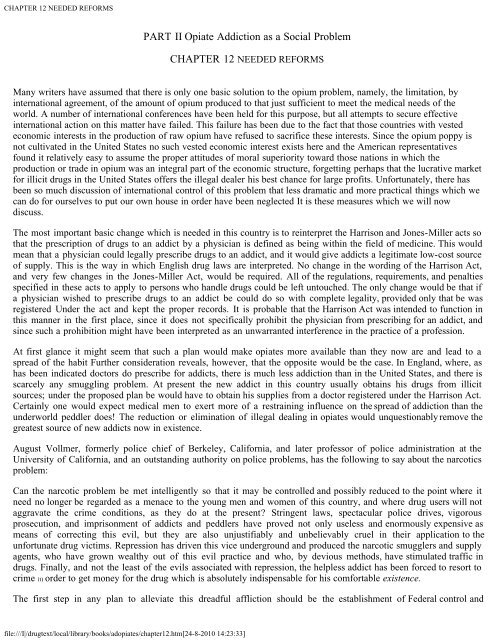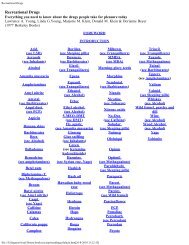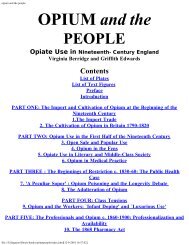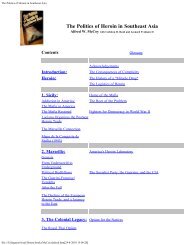Addiction and Opiates
Addiction and Opiates
Addiction and Opiates
You also want an ePaper? Increase the reach of your titles
YUMPU automatically turns print PDFs into web optimized ePapers that Google loves.
CHAPTER 12 NEEDED REFORMS<br />
file:///I|/drugtext/local/library/books/adopiates/chapter12.htm[24-8-2010 14:23:33]<br />
PART II Opiate <strong>Addiction</strong> as a Social Problem<br />
CHAPTER 12 NEEDED REFORMS<br />
Many writers have assumed that there is only one basic solution to the opium problem, namely, the limitation, by<br />
international agreement, of the amount of opium produced to that just sufficient to meet the medical needs of the<br />
world. A number of international conferences have been held for this purpose, but all attempts to secure effective<br />
international action on this matter have failed. This failure has been due to the fact that those countries with vested<br />
economic interests in the production of raw opium have refused to sacrifice these interests. Since the opium poppy is<br />
not cultivated in the United States no such vested economic interest exists here <strong>and</strong> the American representatives<br />
found it relatively easy to assume the proper attitudes of moral superiority toward those nations in which the<br />
production or trade in opium was an integral part of the economic structure, forgetting perhaps that the lucrative market<br />
for illicit drugs in the United States offers the illegal dealer his best chance for large profits. Unfortunately, there has<br />
been so much discussion of international control of this problem that less dramatic <strong>and</strong> more practical things which we<br />
can do for ourselves to put our own house in order have been neglected It is these measures which we will now<br />
discuss.<br />
The most important basic change which is needed in this country is to reinterpret the Harrison <strong>and</strong> Jones-Miller acts so<br />
that the prescription of drugs to an addict by a physician is defined as being within the field of medicine. This would<br />
mean that a physician could legally prescribe drugs to an addict, <strong>and</strong> it would give addicts a legitimate low-cost source<br />
of supply. This is the way in which English drug laws are interpreted. No change in the wording of the Harrison Act,<br />
<strong>and</strong> very few changes in the Jones-Miller Act, would be required. All of the regulations, requirements, <strong>and</strong> penalties<br />
specified in these acts to apply to persons who h<strong>and</strong>le drugs could be left untouched. The only change would be that if<br />
a physician wished to prescribe drugs to an addict be could do so with complete legality, provided only that be was<br />
registered Under the act <strong>and</strong> kept the proper records. It is probable that the Harrison Act was intended to function in<br />
this manner in the first place, since it does not specifically prohibit the physician from prescribing for an addict, <strong>and</strong><br />
since such a prohibition might have been interpreted as an unwarranted interference in the practice of a profession.<br />
At first glance it might seem that such a plan would make opiates more available than they now are <strong>and</strong> lead to a<br />
spread of the habit Further consideration reveals, however, that the opposite would be the case. In Engl<strong>and</strong>, where, as<br />
has been indicated doctors do prescribe for addicts, there is much less addiction than in the United States, <strong>and</strong> there is<br />
scarcely any smuggling problem. At present the new addict in this country usually obtains his drugs from illicit<br />
sources; under the proposed plan be would have to obtain his supplies from a doctor registered under the Harrison Act.<br />
Certainly one would expect medical men to exert more of a restraining influence on the spread of addiction than the<br />
underworld peddler does! The reduction or elimination of illegal dealing in opiates would unquestionably remove the<br />
greatest source of new addicts now in existence.<br />
August Vollmer, formerly police chief of Berkeley, California, <strong>and</strong> later professor of police administration at the<br />
University of California, <strong>and</strong> an outst<strong>and</strong>ing authority on police problems, has the following to say about the narcotics<br />
problem:<br />
Can the narcotic problem be met intelligently so that it may be controlled <strong>and</strong> possibly reduced to the point where it<br />
need no longer be regarded as a menace to the young men <strong>and</strong> women of this country, <strong>and</strong> where drug users will not<br />
aggravate the crime conditions, as they do at the present? Stringent laws, spectacular police drives, vigorous<br />
prosecution, <strong>and</strong> imprisonment of addicts <strong>and</strong> peddlers have proved not only useless <strong>and</strong> enormously expensive as<br />
means of correcting this evil, but they are also unjustifiably <strong>and</strong> unbelievably cruel in their application to the<br />
unfortunate drug victims. Repression has driven this vice underground <strong>and</strong> produced the narcotic smugglers <strong>and</strong> supply<br />
agents, who have grown wealthy out of this evil practice <strong>and</strong> who, by devious methods, have stimulated traffic in<br />
drugs. Finally, <strong>and</strong> not the least of the evils associated with repression, the helpless addict has been forced to resort to<br />
crime it) order to get money for the drug which is absolutely indispensable for his comfortable existence.<br />
The first step in any plan to alleviate this dreadful affliction should be the establishment of Federal control <strong>and</strong>





